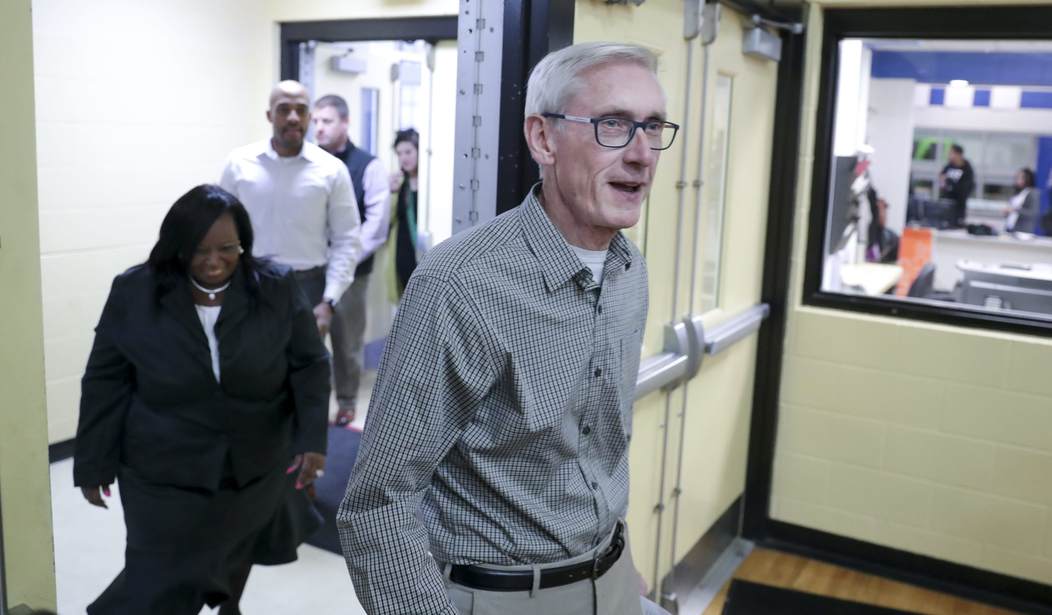Democrat Tony Evers told his supporters, “It’s time for a change, folks,” when he accepted their cheers after winning the highest office in the land of Wisconsin.
“I will be focused on solving problems, not on picking political fights,” Evers added on election night.
Well, good luck with that. Since Republican Gov. Scott Walker is on his way out, and Evers is on his way in, GOP legislative leaders couldn’t agree more. It is time for a change, they say. But it isn’t the change Evers wants. Republicans believe it’s time to rein in the power of the executive branch.
Evers’ victory gave Wisconsin Democrats a hold on real power in state government for the first time in six years. It also brought to an end what the Milwaukee Journal-Sentinel described as an “eight-year reign of Republican dominance and political muscle.”
There will be a real power shift come Jan. 7.
Voters re-elected Democrat Doug La Follette as secretary of State. Sarah Godlewski, another Democrat, won the state treasurer’s race, and Democrat Mandela Barnes will be sworn in as Wisconsin’s new lieutenant governor in January.
But Republicans will still control the legislature. That means several of Evers’ campaign goals such as Act 10, the law that limits union powers and pushed Gov. Walker onto the national GOP stage, will be close to impossible to accomplish.
If Republicans can limit executive branch powers, Evers’ task will be even tougher.
Assembly Speaker Robin Vos (R) wants a special session of the legislature before Evers takes office Jan. 7 to discuss his idea of limiting the governor’s power.
Vos said he knows Evers’ agenda and wants to make sure the Wisconsin Legislature — and Republicans — are “at the table.”
“I also am not going to sit idly by and let him repeal Act 10 by executive action alone, or to try to undermine voter ID, or say that people on welfare don’t have to work,” Vos told the Journal Times. “I want to make sure that, if any of those changes happen, that we’re at the table negotiating and it’s not just him dictating.”
The idea of calling a special legislative session didn’t begin with Evers’ victory. The Associated Press reported Republicans already wanted to meet before the end of the year to talk about putting a $100 million incentive package in front of Kimberly-Clark Corp. as part of a campaign to save about 500 jobs in Appleton, Wis.
Evers said Vos’ proposal to add several items to the agenda aimed at limiting executive power in Wisconsin amount to “playing politics before I take the oath of office.”
“This is a complete violation of the separation of powers in our system,” Evers said. “There is a lot of common ground we can find. But I will not tolerate desperate antics to cling to power and violate the checks and balances of Wisconsin’s government.”
State Rep. Greta Neubauer (D) also criticized Vos’ move. She said the main reason voters elected the Democratic ticket was to “put a check on the Legislature.”
But instead of moving forward and working together, Speaker Vos is “moving to consolidate his own power,” Neubauer said in a statement.
Vos told the Journal Times that Democrats are blowing this all out of proportion.
“I think that Democrats are making a mountain out of a molehill … I don’t like the outcome of the election, but I’ll certainly accept it … it’s about making sure what we have in practice stays in practice,” Vos said.
Vos has made this argument before. Back in 2016, when Gov. Scott Walker’s power was unquestioned, the speaker told Governing staff writer Alan Greenblatt it was time for the Wisconsin legislature to be stronger.
“In a world that is so driven by the executive branch, the legislative branch really should be more prominent than it is,” Vos said back then. “My goal is that when I leave, the legislative branch is equally as important as the governor.”
That being true, Sen. Jon Erpenbach, another Democrat, wondered aloud to the Associated Press why, if Vos wanted to rein in the executive branch, he didn’t act two years ago.
Peverill Squire, who studies legislatures at the University of Missouri, told Governing the Wisconsin debate over legislative versus executive branch power is more evidence that political norms in the U.S. are out of whack.
“Political norms continue to be under attack,” Squire said. “Most voters are apt to see them as ‘sore loser’ power grabs, and that may ultimately rebound against the party that pursues them.”
Urban Milwaukee’s “Data Wonk” Bruce Thompson opined that what’s happening in Madison is very much the old normal for politics in Wisconsin. Thompson believes Vos’ move was nothing but a desperate move by Republicans to hold on to political power.
“Vos and Senate Majority Leader Scott Fitzgerald are suggesting that the wisdom of a law depends on who is governor. This runs counter to the bedrock American principle that we are a government of laws, not of people,” Thompson wrote.
“Vos and Fitzgerald,” Thompson concluded, “have effectively demonstrated that banana republic politics are alive and well in Wisconsin.”









Join the conversation as a VIP Member